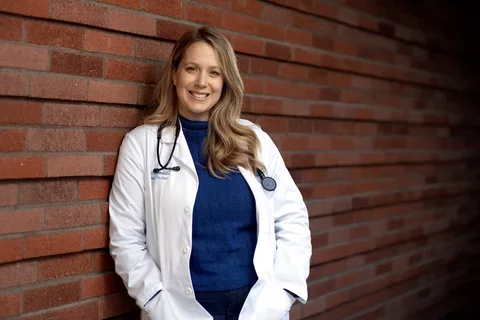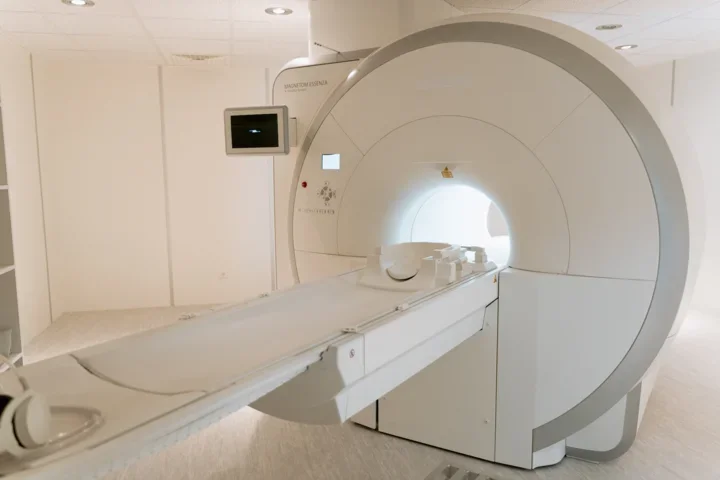A DGSOM student's late husband benefited from blood donations - now she's calling on her peers to donate for others

Blood donations kept Ryan Sebastian alive long enough to meet his newborn son.
While Caitlin Sebastian was waiting around in the hospital during her late husband’s hours-long chemotherapy sessions, she decided to fill her time with a worthwhile cause: donating blood.
At the time, Sebastian didn’t realize blood donations such as hers can extend patients’ lives long enough to reach milestone moments. Indeed, because of donations, her husband lived long enough to meet their premature baby.
In 2015, Sebastian and her husband, Ryan, were East Coast transplants living and working in Los Angeles. Ryan went to the hospital for what he thought was a shoulder injury but an X-ray revealed he had osteosarcoma - a type of cancer that forms in the bones - with an 80% chance of survival over five years.
After the diagnosis, the couple moved back to Massachusetts, and for a year Ryan underwent chemotherapy at the Dana Farber Cancer Institute. They returned to California after Ryan completed treatment, but visited Boston two months later so Sebastian could run the Boston Marathon to raise money for the hospital that took care of her husband.
The marathon was supposed to be an end-of-treatment celebration, but a scan at Dana Farber revealed Ryan’s cancer had spread throughout his body. Knowing that his cancer was terminal, Ryan wanted to stay in Los Angeles to be close to his job at SpaceX throughout the rest of his treatment. He was referred to UCLA Health to be treated by Dr. Arun Singh, a sarcoma oncologist that trained at Dana Farber, for the remaining 14 months of his life.
A calling
Ryan Sebastian (Photo courtesy of Caitlin Sebastian)
Well aware of his terminal diagnosis, Ryan was so passionate about his job at SpaceX working was how he wanted to spend his limited time. In fact, he worked up until the week before his death. A real estate agent, Sebastian could not say the same about her work.
“Had I got the same diagnosis, I would not have continued to work so it was really important to me to find my life’s calling,” Sebastian said. She was ready to embark upon a career change.
After spending hours in the hospital during Ryan’s three-year treatment and seeing the great care he received, Sebastian was inspired to pursue a path in medicine and moved back home to Massachusetts. Taking the science courses required for a medical school application and working in cancer research at Dana Farber was no easy feat for a single mom.
Still, Sebastian said the classes, shadowing doctors, and teaching chemistry at Harvard never felt like work, which was validation that she had chosen the right path. She’s now a first-year medical student at the David Geffen School of Medicine at UCLA.
In the nick of time
During Ryan’s last days, his organs were failing, his blood oxygen was low, and his respiratory rates were abnormal. But he was able to meet his newborn son, Charlie, and, at the moment they met, his respiratory rate returned to a stable range.
“You can see the calm and peace that getting to meet Charlie brought him, like meeting his son was like the greatest accomplishment of his life,” Sebastian said.
Why blood donations are critical
Patients with cancer rely on blood transfusions for an array of reasons. Sometimes, they have lost blood during surgery, or chemotherapy can damage bone marrow, which causes low blood cell counts. Patients that have experienced a major accident or have a blood disorder are also in need of blood transfusions.
Sebastian is hoping her husband’s story will inspire people to donate, especially given there was a national blood shortage earlier this year.
Charlie Sebastian (Photo courtesy of Caitlin Sebastian)
When Sebastian worked at Dana Farber, she continued to donate blood regularly and encouraged her colleagues to do the same. Now, she’s inspiring her fellow classmates by sharing how blood donations were pivotal in prolonging Ryan’s life long enough to meet his son.
While listening to a lecture about blood donation medicine, which is how to match blood donors with recipients, Sebastian got the idea to organize a blood drive among her medical student peers.
“So many of us would donate if it was organized and it was easy,” Sebastian said. According to the American Red Cross, 6.8 million people in the U.S. donate annually.
With the help of other medical students Melissa Lopez, Martin Ramirez, Aboubacar Cherif and Adeline Lee, the first blood drive is set to take place on Friday, Jan. 13, from 11 am– 4 pm, at Geffen Hall 122. Sebastian has plans to organize another drive in April, in honor of Ryan’s birthday.
For more information on donating blood, visit the UCLA Health Blood & Platelet Center.
Original Article: "A DGSOM student's late husband benefited from blood donations - now she's calling on her peers to donate for others"



